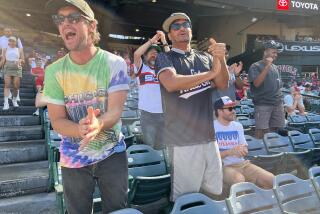It’s a Bad Time to Bring Up These Questions
- Share via
NEW YORK — Three innings from clinching.
Three innings of clenching.
The Angels had their fingers around the champagne that would christen a voyage to the American League championship series in Chicago.
But those fingers stiffened, their grip tightened, and, quite suddenly and rather loudly, the moment shattered in their hands.
So late Sunday, those same Angels instead boarded a flight to Southern California, to a deciding division series Game 5 against the New York Yankees, with stopovers in doubt and regret.
“The ways things are going, who knows what’s going to happen,” said Chone Figgins, shaking his head.
A day earlier, they knew, they all knew, these Angels who were smarter and more skilled than those blustery Yankees.
Now, they’re not so sure.
This is what happens when you tumble from a 2-1 lead to a 3-2 loss in three long innings surrounded by three large questions.
What was Mike Scioscia thinking? What was Scot Shields doing? Why did Chone Figgins bounce it?
Whether those queries become a winter’s footnotes or focus will be decided today starting at 5:15 p.m. in Angel Stadium in a game the Angels neither wanted nor needed.
“Now it’s anything goes, everybody laying it on the line,” Adam Kennedy said.
It didn’t have to be this hard. Beginning with two out in the sixth inning of Game 4, it could have been something else entirely.
The Angels had their best second-half pitcher on the mound. They had residents of the league’s best bullpen stretching their arms. They had members of the league’s best defense pawing the dirt.
Even a roaring Yankee Stadium crowd that gave departing Bernie Williams a curtain call for a fly out was growing somber.
“This ballclub is not easy to score against,” said Yankee Manager Joe Torre later.
“They match up really well now, from the sixth inning on.”
There were two out in that sixth, the Yankees had just scored their first run on Gary Sheffield’s line drive single, and here came that first question.
Why did Scioscia choose this moment to replace starter John Lackey?
He was making an emergency start on three days’ rest because Jarrod Washburn was suffering from flu, but he had been making the Yankees absolutely sick.
He had given up two hits, but only one that was uncatchable. Of 22 batters he had faced, only four had hit the ball out of the infield.
In a statistic that seemed to amaze even him, of his 78 pitches, 15 were called, frozen-batter strikes.
“I was really dialed in,” Lackey said.
And then he was disconnected, because Scioscia was worried that he would tire because of the short rest and wanted no more than one runner on base for Shields.
“John was OK to a certain extent, but I thought he only had about 10 more pitches,” Scioscia said. “I wanted to get him out of there and give Shields a little wiggle room.”
Later it was Lackey who was squirming in discomfort, and who can blame him?
A guy who once won a World Series Game 7 on short rest deserved a chance to work more of this one.
“I was disappointed a little bit,” said Lackey. “I thought I was pitching well enough to decide that game for us.”
Shields was certainly a worthy replacement on paper, having given up only two runs in his last 16 innings. But he has appeared in all four division series games, he had thrown 36 pitches on Friday, and suddenly he looked like it.
After Shields escaped the sixth inning jam by inducing a grounder by Hideki Matsui, he appeared inexplicably lost control in the seventh.
He threw first-pitch balls to all six of the batters he faced. He walked Jorge Posada on a ball that was several feet wide. He gave up a tying single to ancient Ruben Sierra after falling behind 2-and-0 to the free swinger.
“I felt strong, I felt fine, I just didn’t get the job done,” said Shields, who, as always, answered every question and made no excuses.
He would have been out of the inning if not for the third question mark.
It involved Figgins, whose fielding has saved two games in this series, but who needed to make one more throw to finish the job.
He couldn’t do it. With runners on first and third, he fielded a slow grounder from Derek Jeter and threw a one-hopper wide to Bengie Molina, allowing Jorge Posada to score.
Figgins said he was playing back, and therefore forced to rush the throw.
Scioscia said he was playing in a position where he could have made the throw without rushing.
Said Figgins: “I was playing back, I had to get it there.”
Said Scioscia: “He had a little more time than he thought.”
Whatever the case, Molina decided the issue, saying, “If the throw is right on the line, we get him out. But that part of the game is going to happen to anybody.”
Perhaps. But things happened Sunday that don’t often happen to the Angels.
Questioning of the manager? Scuffles by the bullpen? A bad throw by an infielder?
“At this point, none of it matters, right?” Shields said. “We have one more game to play.”
At this point, they can only hope it’s not one too many.
Bill Plaschke can be reached at bill.plaschke@latimes.com. To read previous columns by Plaschke, go to latimes.com/plaschke.
More to Read
Go beyond the scoreboard
Get the latest on L.A.'s teams in the daily Sports Report newsletter.
You may occasionally receive promotional content from the Los Angeles Times.








